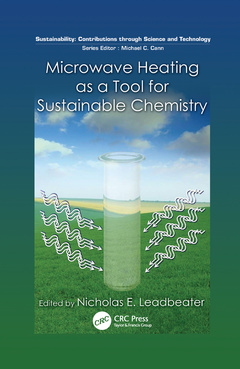Description
Microwave Heating as a Tool for Sustainable Chemistry
Sustainability: Contributions through Science and Technology Series
Coordinator: Leadbeater Nicholas E.
Language: English
Subjects for Microwave Heating as a Tool for Sustainable Chemistry:
Keywords
Microwave Heating; Kalata B1; microwave; Domestic Microwave Oven; organometallic; Scientic Microwave; polymer; Pe Rc; CEM Mars; CEM Discover; ILs; Solvent Free Conditions; Microwave Unit; Microwave Reactors; NH Ph; Undergraduate Laboratory; Copyright American Chemical Society; Alkenyl Succinic Anhydrides; Lead Optimization; Specic Microwave Effects; Pu Foam; Cycle Time; Organic Chemistry Laboratory; Suzuki Coupling; Constant Microwave Power; Transition Metal; Barium Zirconium Titanate; Aza Michael Addition
Publication date: 05-2017
· 15.6x23.4 cm · Paperback
Publication date: 10-2010
320 p. · 15.6x23.4 cm · Hardback
Description
/li>Contents
/li>Readership
/li>Biography
/li>
Shorter reaction times, higher product yields, and enhanced selectivity are some of the advantages microwave heating has over conventional methods, causing its use to transition from a curiosity to mainstream, both in industrial and academic settings. Microwave Heating as a Tool for Sustainable Chemistry showcases the application of microwave heating in a number of areas of preparative chemistry as well as in the biosciences.
From organic chemistry to materials and biological applications
The book begins with an introduction to microwave heating, the physical concepts behind it, its application in synthetic chemistry, and commercially available microwave equipment. It shows how microwave heating can be used to facilitate the clean and sustainable synthesis of organic compounds. The authors examine microwave heating as a tool for sustainable polymer chemistry, with discussions of the use of alternative solvents and feedstocks, the design of degradable polymeric materials, and recycling polymers. They then discuss the significant contribution made by microwave-promoted synthesis in the drug discovery process, with a focus on how the technology has been used to generate discovery chemistry libraries and as a tool for medicinal chemists. Other topics examined in this application-driven text include the use of microwave heating in the preparation of inorganic and organometallic compounds, in the production of inorganic materials, and in the area of biosciences.
Academic and industrial settings
The book examines the scale-up of microwave-promoted chemistry and describes the various approaches and the current commercially available microwave reactors available for scale-up. It also discusses microwave heating as a tool for teaching in the undergraduate organic chemistry laboratory. It explores curriculum, the broad range of reactions that can be performed, and the incorporation of green chemistry principles.
The author maintains a website with supplemental information.
Microwave Heating as a Tool for Sustainable Chemistry: An Introduction. Microwave Heating as a Tool for Organic Synthesis. Microwave Heating as a Tool for Sustainable Polymer Chemistry. Microwave Heating as a Tool for Drug Discovery. Microwave Heating as a Tool for Process Chemistry. Microwave Heating as a Tool for the Undergraduate Organic Chemistry Laboratory. Microwave Heating as a Tool for Inorganic and Organometallic Synthesis. Microwave Heating as a Tool for Materials Chemistry. Microwave Heating as a Tool for the Biosciences. Index.




